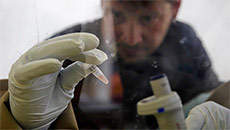Do-it-yourself flu vaccine? It could happen. Military folks who squirted vaccine up their noses were as well-protected as others who got it from health workers, a study found.
There's no reason civilians couldn't do the same, especially for children who might be less scared if vaccine was given by mom or dad, the study leader said.
"A parent could easily administer it. You can't go wrong," and having a DIY option might improve vaccination rates, said Eugene Millar of the Uniformed Services University of the Health Sciences in Rockville, Maryland.
So far, only health professionals are allowed to give MedImmune's FluMist, the only flu vaccine sold as a nasal spray. The government says it's the preferred method for healthy kids ages 2 to 8 if it's available; it's approved for ages 2 through 49.
In an epidemic or rapid deployment, there might not be enough health workers to give vaccine quickly enough to protect troops in crowded barracks, so Millar's study tested DIY as a practical solution.
During the last two flu seasons, more than 1,000 service members and their families at military hospitals in San Diego and San Antonio either got FluMist from health workers or gave it to themselves, individually or in a group session. Blood tests later showed no difference in immune responses among the groups.
The vaccine comes in pre-filled syringes with a stopper that automatically divides the dose in half, for each nostril.
"It's easy," and participants preferred the DIY method, Millar said.
That doesn't mean it's ready for broader use, said Dr. Jonathan Temte, a University of Wisconsin family medicine specialist who heads a panel that advises the Centers for Disease Control and Prevention on vaccine policy.
"It's a very interesting concept and I can definitely see some benefits" for overcoming vaccine hesitation, Temte said. "Before anyone could endorse this in children, one would have to have an appropriately designed study that shows equal efficacy, equal safety, and then the acceptability."
There are other good reasons to keep health workers involved where kids are concerned, he said. A yearly flu vaccination is recommended for nearly everyone over 6 months old, but children 6 months to 8 years of age getting their very first flu vaccine need two doses at least four weeks apart. Health workers also need to ensure the vaccine gets in, and that parents would not squirt it into a nose full of discharge, he said.
The study was sponsored by the U.S. Military Vaccine Agency. Results are to be presented later this week at a meeting of the Infectious Diseases Society of America and several other groups in Philadelphia.
Online:
Vaccine info: http://www.cdc.gov/flu/about/qa/nasalspray.htm





